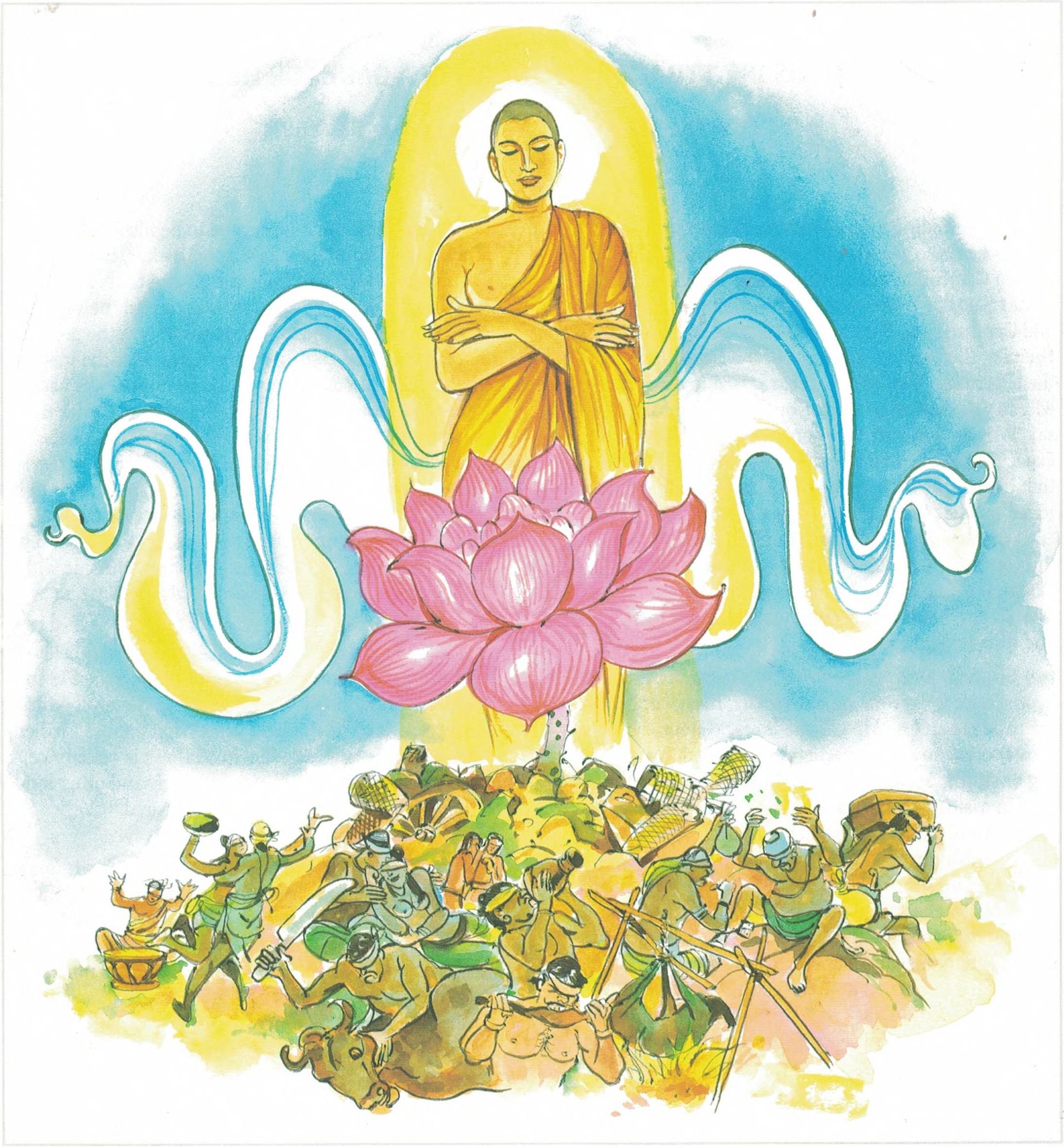Dhammapada (Illustrated)
by Ven. Weagoda Sarada Maha Thero | 1993 | 341,201 words | ISBN-10: 9810049382 | ISBN-13: 9789810049386
This page describes The Story of Garahadinna which is verse 58-59 of the English translation of the Dhammapada which forms a part of the Sutta Pitaka of the Buddhist canon of literature. Presenting the fundamental basics of the Buddhist way of life, the Dhammapada is a collection of 423 stanzas. This verse 58-59 is part of the Puppha Vagga (Flowers) and the moral of the story is “Just as a fragrant and lovely lotus may blossom forth out of a garbage-heap on the roadside” (first part only).
Verse 58-59 - The Story of Garahadinna
Pali text, illustration and English translation of Dhammapada verse 58-59:
yathā saṅkāradhānasmiṃ ujjhitasmiṃ mahāpathe |
padumaṃ tattha jāyetha sucigandhaṃ manoramaṃ || 58 ||
evaṃ saṅkārabhūtesu andhabhūte puthujjane |
atirocati paññāya sammāsambuddhasāvako || 59 ||
58. As beside the high-road where rubbish in a pit is flung there flourishes the lotus bloom fragrant and the mind’s delight…
59. …So among rubbish-beings, common humans blind become, the Perfect Buddha’s pupil Outshines with wisdom bright.
 Just as a fragrant and lovely lotus may blossom forth out of a garbage-heap on the roadside… |
 …Likewise in this worldly mess, the disciple outshines the blinded worldlings by his wisdom. |
The Story of Garahadinna
While residing at the Jetavana Monastery, the Buddha spoke these verses, with reference to a rich man named Garahadinna and the miracle of the lotus flowers. At Sāvatthi there once lived two friends, Sirigutta and Garahadinna. The former was a lay disciple of the Buddha, the latter an adherent of the Naked Ascetics, the Nigaṇṭhas. The naked ascetics used to say repeatedly to Garahadinna, “Go to your friend Sirigutta and say ‘Why do you visit the monk Gotama? What do you expect to get from him?’ Why not admonish him thus, that he may visit us and give us alms?” Garahadinna listened to what they said, went repeatedly to Sirigutta, and wherever he found him, standing or sitting, spoke thus to him, “Friend, of what use to you is the monk Gotama? What do you expect to get by visiting him? Should you not visit my own noble teachers instead and give alms to them?”
Sirigutta listened to his friend’s talk and despite it kept silence for several days. One day, however, he lost his patience and said to Garahadinna, “Friend, you constantly come to me, and wherever you find me, standing or sitting, speak thus to me, ‘What do you expect to gain by visiting the monk Gotama? Visit my noble teachers instead and give alms to them.’ Now just answer me this question, ‘What do your noble teachers know?’” “Oh, sir, do not speak thus! There is nothing my noble teachers do not know. They know all about the past, the present, and the future. They know everybody’s thoughts, words, and actions. They know everything that can happen and everything that cannot happen.” “You don’t say so.” Indeed, I do.” If this be true, you have committed a grievous fault in allowing me to remain ignorant of it all this time. Not until today did I learn of the supernatural power of knowledge possessed by your noble teachers. Go, sir, and invite your noble teachers in my name.”
Garahadinna went to the naked ascetics, paid obeisance to them, and said, “My friend Sirigutta invites you for tomorrow.” “Did Sirigutta speak to you of himself?” “Yes, noble sirs.” They were pleased and delighted. Said they, “Our work is done. What gain will not accrue to us from the moment Sirigutta has complete faith in us?”
Now Sirigutta’s place of residence was a large one, and in one place there was a long empty space between two houses. Here, therefore, he caused a long ditch to be dug, and this ditch he caused to be filled with dung and slime. Beyond the ditch, at both ends, he caused posts to be driven into the ground, and to these posts he caused ropes to be attached. He caused the seats to be so placed, with the front legs resting on the ground and the back legs resting on the ropes, that the instant the heretics sat down they would be tipped over backwards and flung head first into the ditch. In order that no sign of a ditch might be visible, he had coverlets spread over the seats. He caused several large earthenware vessels to be washed clean, and their mouths to be covered with banana leaves and pieces of cloth. And these vessels, empty though they were, he caused to be placed behind the house, smeared on the outside with rice-porridge, lumps of boiled rice, ghee, palm sugar and cake-crumbs.
Early in the morning Garahadinna went quickly to the house of Sirigutta and asked him, “Has food been prepared for my noble teachers?” “Yes, friend, food has been prepared.” “But where is it?” In all these earthenware vessels is rice-porridge, in all these is boiled rice, in all these are ghee, palm sugar, cakes, and other kinds of food. Likewise have seats been prepared.” “Very well,” said Garahadinna, and went his way.
As soon as Garahadinna had departed, five hundred naked ascetics arrived. Sirigutta came forth from the house, paid obeisance to the naked ascetics, and taking his stand before them, and raising his clasped hands in an attitude of reverent salutation, thought to himself, “So you know all about the past, the present, and the future! So at least your supporter tells me. If you really do know all this, do not enter my house. For even if you enter my house, there is no rice-porridge prepared for you, nor boiled rice, nor any other kind of food. If you do not know all this and still enter my house, I will cause you to be flung into a ditch filled with dung, and will then cause you to be beaten with sticks.” Having thus reflected, he gave the following order to his men, “When you observe that they are about to sit down, take your places in the rear and pull the coverlets which are spread over the seats out from under, lest the coverlets be smeared with filth.” As Sirigutta thought, the naked ascetics were unaware of what had been planned. They fell into the ditch and were disgraced.
Garahadinna, planning to take revenge, invited the Buddha. The Buddha, accompanied by five hundred monks, went to the house of Garahadinna and stood before the door. Garahadinna came forth from the house, paid obeisance to the monks with the five rests, and taking his stand before them and raising his clasped hands in an attitude of reverent salutation, thought to himself, “So, Venerable, you know all about the past, the present, and the future! In sixteen different ways you comprehend the thoughts of all living beings! So at least your supporter tells me. If you really do know all this, do not enter my house. For even if you enter my house, you will find no riceporridge or boiled rice or any other kind of food. Instead I will cause you to be flung into a charcoal-pit and will bring humiliation upon you.”
But, contrary to his thought, a miracle happened. Lotus flowers as big as cart wheels sprang up, rending the charcoal-pit asunder. “What am I to do?” Garahadinna asked Sirigutta. “Did you not just now point out to me certain earthenware vessels and say, ‘All these vessels are filled with rice-porridge;all these are filled with boiled rice,’ and so forth?” “What I said was false, master. The vessels are empty.” “Never mind. Go look at the rice-porridge and other kinds of food in those vessels.” At that instant the vessels over which he spoke the word “rice-porridge” were filled with rice-porridge, the vessels over which he spoke the words “boiled rice” were filled with boiled rice, and so it happened likewise with the other vessels.
When Garahadinna saw this miracle, he was filled with joy and happiness and his heart was filled with faith. With profound reverence he waited on the congregation of Monks presided over by the Buddha. The meal over, Garahadinna, indicating that he wished the Buddha to speak the words of thanksgiving, took his bowl. Thus Garahadinna was converted into a faithful disciple of the Buddha.
Explanatory Translation (Verse 58)
yathā saṅkāradhānasmiṃ mahāpathe ujjhitasmiṃ
tattha sucigandhaṃ manoramaṃ padumaṃ jāyetha
yathā: just as; saṅkāradhānasmiṃ [saṅkāradhānasmi]: in a heap of garbage; mahāpathe ujjhitasmiṃ [ujjhitasmi]: dumped beside a highway; tattha: there; sucigandhaṃ [sucigandha]: sweet smelling; manoramaṃ [manorama]: attractive;padumaṃ [paduma]: a lotus; jāyetha: may grow
Someone is likely to dump refuse on a high road. In that heap of refuse, a sweet-smelling lotus is likely to grow.
Explanatory Translation (Verse 59)
evaṃ saṅkārabhūtesu sammā sambuddhasāvako
andhabhūte puthujjane paññāya atirocati
evaṃ: similarly; saṅkārabhūtesu: among those who have become garbage; sammā sambuddhasāvako [sambuddhasāvaka]: a disciple of the Buddha; andhabhūte puthujjane: among the blinded worldlings; paññāya: through wisdom; atirocati: shines greatly
In the same way, in the heap of rubbish made up of various types of foolish people, the disciple of the Buddha shines above all others.
Commentary and exegetical material (Verse 58-59)
padumaṃ tattha jāyetha: a lotus is quite likely to arise. The emergence of the exceptional out of the lowly and the depraved, is a recurrent theme in the Buddha’s discourses. The wise person who has overcome the worldly, though arisen out of the ordinary folk, is likened to a lotus. Though sprung out of the mud, the lotus is uncontaminated by the mud. In these verses, the wise truth-seeker is compared to a lotus springing out of the wayside dump. Though risen out of the mud, the lotus is beautiful and fragrant, very much like the saintly person who has emerged out of corrupt people.
Atirocati paññāya: through wisdom one shines greatly. Nobody is condemned in Buddhism, for greatness is latent even in the seemingly lowliest just as lotuses spring from muddy ponds.
